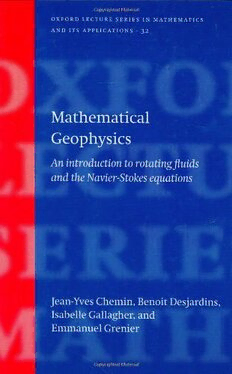Download Mathematical geophysics: an introduction to rotating fluids and the Navier-Stokes equations PDF Free - Full Version
Download Mathematical geophysics: an introduction to rotating fluids and the Navier-Stokes equations by Jean-Yves Chemin, Benoit Desjardins, Isabelle Gallagher, Emmanuel Grenier in PDF format completely FREE. No registration required, no payment needed. Get instant access to this valuable resource on PDFdrive.to!
About Mathematical geophysics: an introduction to rotating fluids and the Navier-Stokes equations
Aimed at graduate students, researchers and academics in mathematics, engineering, oceanography, meteorology, and mechanics, this text provides a detailed introduction to the physical theory of rotating fluids, a significant part of geophysical fluid dynamics. The text is divided into four parts, with the first part providing the physical background of the geophysical models to be analyzed. Part two is devoted to a self contained proof of the existence of weak (or strong) solutions to the imcompressible Navier-Stokes equations. Part three deals with the rapidly rotating Navier-Stokes equations, first in the whole space, where dispersion effects are considered. The case where the domain has periodic boundary conditions is then analyzed, and finally rotating Navier-Stokes equations between two plates are studied, both in the case of periodic horizontal coordinated and those in R2. In Part IV, the stability of Ekman boundary layers and boundary layer effects in magnetohydrodynamics and quasigeostrophic equations are discussed. The boundary layers which appear near vertical walls are presented and formally linked with the classical Prandlt equations. Finally spherical layers are introduced, whose study is completely open.
Detailed Information
| Author: | Jean-Yves Chemin, Benoit Desjardins, Isabelle Gallagher, Emmanuel Grenier |
|---|---|
| Publication Year: | 2006 |
| Pages: | 262 |
| Language: | English |
| File Size: | 1.367 |
| Format: | |
| Price: | FREE |
Safe & Secure Download - No registration required
Why Choose PDFdrive for Your Free Mathematical geophysics: an introduction to rotating fluids and the Navier-Stokes equations Download?
- 100% Free: No hidden fees or subscriptions required for one book every day.
- No Registration: Immediate access is available without creating accounts for one book every day.
- Safe and Secure: Clean downloads without malware or viruses
- Multiple Formats: PDF, MOBI, Mpub,... optimized for all devices
- Educational Resource: Supporting knowledge sharing and learning
Frequently Asked Questions
Is it really free to download Mathematical geophysics: an introduction to rotating fluids and the Navier-Stokes equations PDF?
Yes, on https://PDFdrive.to you can download Mathematical geophysics: an introduction to rotating fluids and the Navier-Stokes equations by Jean-Yves Chemin, Benoit Desjardins, Isabelle Gallagher, Emmanuel Grenier completely free. We don't require any payment, subscription, or registration to access this PDF file. For 3 books every day.
How can I read Mathematical geophysics: an introduction to rotating fluids and the Navier-Stokes equations on my mobile device?
After downloading Mathematical geophysics: an introduction to rotating fluids and the Navier-Stokes equations PDF, you can open it with any PDF reader app on your phone or tablet. We recommend using Adobe Acrobat Reader, Apple Books, or Google Play Books for the best reading experience.
Is this the full version of Mathematical geophysics: an introduction to rotating fluids and the Navier-Stokes equations?
Yes, this is the complete PDF version of Mathematical geophysics: an introduction to rotating fluids and the Navier-Stokes equations by Jean-Yves Chemin, Benoit Desjardins, Isabelle Gallagher, Emmanuel Grenier. You will be able to read the entire content as in the printed version without missing any pages.
Is it legal to download Mathematical geophysics: an introduction to rotating fluids and the Navier-Stokes equations PDF for free?
https://PDFdrive.to provides links to free educational resources available online. We do not store any files on our servers. Please be aware of copyright laws in your country before downloading.
The materials shared are intended for research, educational, and personal use in accordance with fair use principles.

